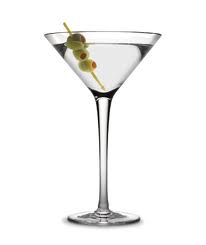Martini Drink Recipe
Ingredients and Preparation:
note: Martini glass
(yield: 1 cocktail)
Ingredients:
- 2 1/2 oz gin ( if you wish… substitute with Vodka)
- 1/2 oz dry vermouth
(dry Martini… wet glass and empty, or no vermouth) - 1 green olive or lemon twist
… or as a Gibson, a small onion for garnish - Orange or Angostura bitters (optional)
How the Martini was Named
There are as many storied origins of the martini as there are ways to make one… Some believe that a New York bartender named Martini invented the drink in 1912 while some believe it to be invented in San Francisco by Professor Jerry Thomas around 1850 for a miner on his way to Martinez, California. Lore says that a miner placed a nugget of gold on Jerry’s bar and challenged him to concoct something special. The result was the Martinez, the said prototype of the Martini. The Martinez was first published in The Bartenders Guide in 1887, the first bartenders manual of its kind and was made with a full wine glass of sweet vermouth, one (1) ounce of Old Tom Gin, some bitters and a dash or two of maraschino. In those days, if the drink weren’t sweet enough, gum syrup was added.
The citizenry of Martinez, California believe that the martini was first concocted right there in Martinez by a bartender named Julio Richelieu in 1870. They claim that a miner became disenchanted with the whisky Richelieu served him. After all, he paid for the whisky with a pouch of gold. So, Richelieu concocted a glass of gin, vermouth, orange, bitters and an olive to make up for the difference. Thus was born the Martinez.
The Oxford English Dictionary credits Martini and Rossi with the martini. In 1871, the company, then named Martini e Sola, shipped 100 cases of red vermouth to New York. Unfortunately, this was 20 years later than Jerry Thomas’ concoction and a full year later than Richelieu’s serving to a disgruntled miner.
Martini History – A Medicinal Application
The martini owes its heritage to gin, a mixture of grain alcohol and juniper berry oil. Gin was originally concocted by a 17th century Dutch medical professor named Francois de Boe Sylvius to relieve kidney disorders and to purify the blood. Gin also treated stomach aches, gout and gallstones so it is easy to imagine how popular “genever” was, especially since it gave the drinker a nice buzz. Genever, the Dutch word for juniper, or gin was also pretty tasty and cheap and easy to produce.

